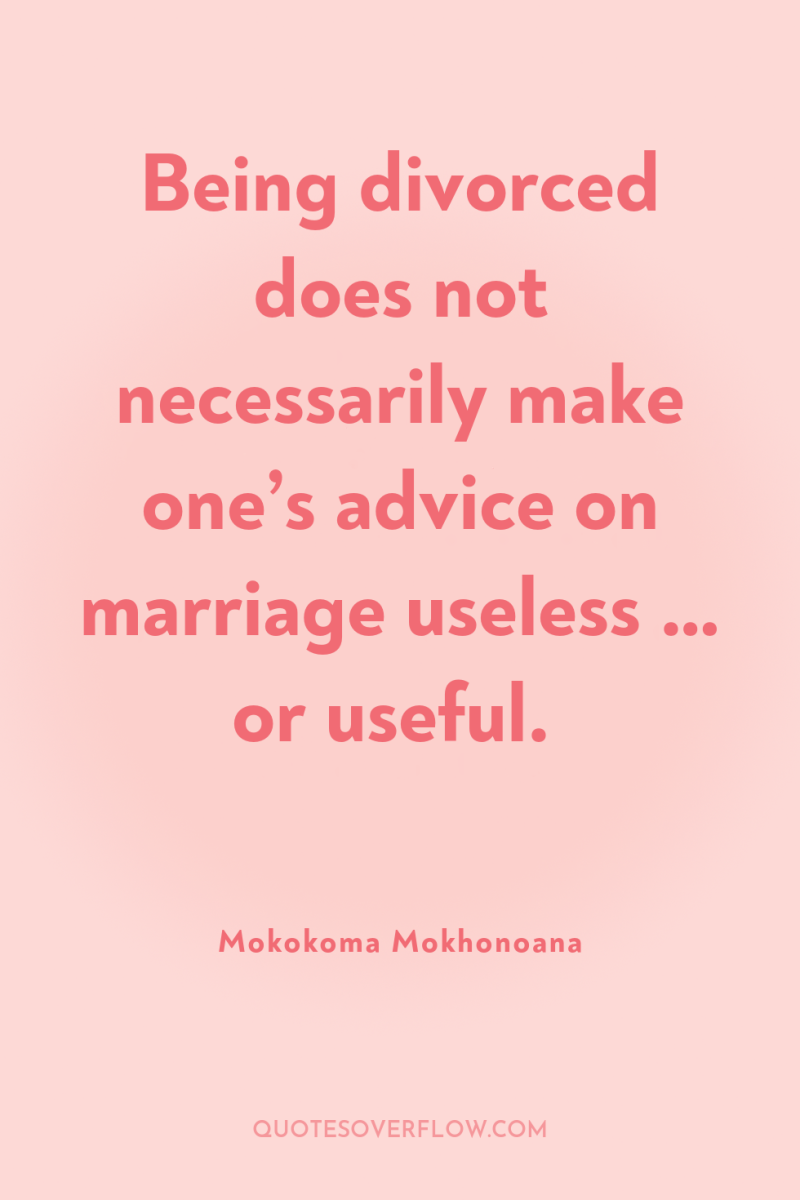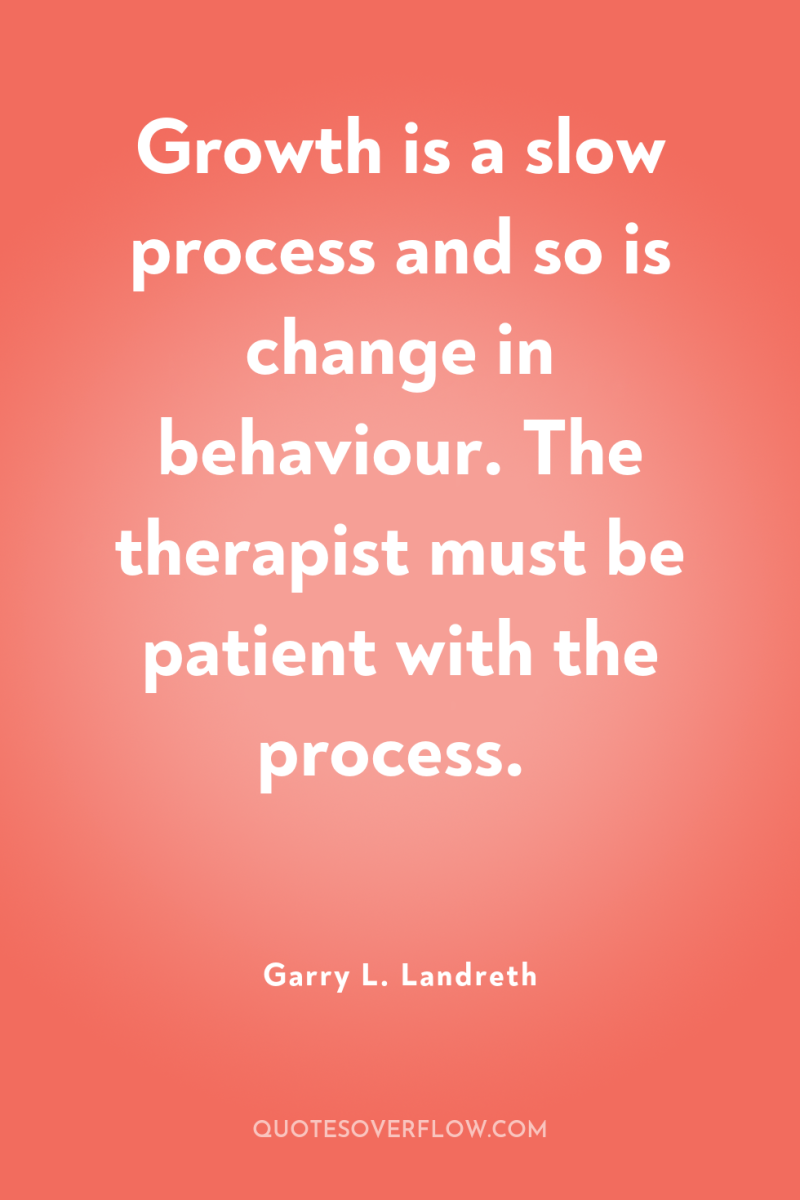
1
Being divorced does not necessarily make one’s advice on marriage useless … or useful.Mokokoma Mokhonoana

2
Growth is a slow process and so is change in behaviour. The therapist must be patient with the process.Garry L. Landreth
3
The counsellor who never reads a novel or never opens a book of poetry is neglecting an important resource for empathic development.Dave Mearns
4
With perseverance and endurance you can survive any storm.Lailah Gifty Akita
5
There is a perfect marriage. Any marriage counselor can tell you that.Ljupka Cvetanova
6
In all spheres of life, we find the grace of patient endurance.Lailah Gifty Akita
7
Marriages can endure any difficulty with unfailing love and dedication.Lailah Gifty Akita
8
Every sacred marriage will survive all times with great love and patient commitment.Lailah Gifty Akita
9
The role of Cherishing in Bereavement - I think that the key to healthy grieving is to cherish those who have passed on, so that you celebrate their lives and the times you did have together with thankfulness, instead of trying to cling on and wish that things were different. I believe that you should let them go in peace with love, not try to hang on to their spirits, just hold the precious moments gently in your heart.Jay Woodman
10
In a world where we seem to be beset by a trend towards 'manualising treatment modalities' the person-centred approach stands and says NO, that is not the way forward.Richard BryantJefferies
11
For example, in order to identify these schemas or clarify faulty relational expectations, therapists working from an object relations, attachment, or cognitive behavioral framework often ask themselves (and their clients) questions like these: 1. What does the client tend to want from me or others? (For example, clients who repeatedly were ignored, dismissed, or even rejected might wish to be responded to emotionally, reached out to when they have a problem, or to be taken seriously when they express a concern.) 2. What does the client usually expect from others? (Different clients might expect others to diminish or compete with them, to take advantage and try to exploit them, or to admire and idealize them as special.) 3. What is the client’s experience of self in relationship to others? (For example, they might think of themselves as being unimportant or unwanted, burdensome to others, or responsible for handling everything.) 4. What are the emotional reactions that keep recurring? (In relationships, the client may repeatedly find himself feeling insecure or worried, self-conscious or ashamed, or–for those who have enjoyed better developmental experiences–perhaps confident and appreciated.) 5. As a result of these core beliefs, what are the client’s interpersonal strategies for coping with his relational problems? (Common strategies include seeking approval or trying to please others, complying and going along with what others want them to do, emotionally disengaging or physically withdrawing from others, or trying to dominate others through intimidation or control others via criticism and disapproval.) 6. Finally, what kind of reactions do these interpersonal styles tend to elicit from the therapist and others? (For example, when interacting together, others often may feel boredom, disinterest, or irritation; a press to rescue or take care of them in some way; or a helpless feeling that no matter how hard we try, whatever we do to help disappoints them and fails to meet their need.).Edward Teyber
12
Psychotherapy and counselling should make people aware of themselves and of the difficulties which they face. This then gives them the freedom to choose for themselves. In this sense, unlike behaviour therapy, psychotherapy is value-free: no advice, suggestions or recriminations are given. Indeed the only value of psychotherapy is respect for the individual. Such respect, however, in a mechanistic and objectifying society. . becomes a political act.Paul Kline
13
It was regarded as almost outside the proper interest of an analyst to give systematic attention to a person's real experiences.John Bowlby
14
Accept corrections and you’ll improve and increase.Israelmore Ayivor
15
Too often the survivor is seen by [himself or] herself and others as "nuts, " "crazy, " or "weird." Unless her responses are understood within the context of trauma. A traumatic stress reaction consists of *natural* emotions and behaviors in response to a catastrophe, its immediate aftermath, or memories of it. These reactions can occur anytime after the trauma, even decades later. The coping strategies that victims use can be understood only within the context of the abuse of a child. The importance of context was made very clear many years ago when I was visiting the home of a Holocaust survivor. The woman's home was within the city limits of a large metropolitan area. Every time a police or ambulance siren sounded, she became terrified and ran and hid in a closet or under the bed. To put yourself in a closet at the sound of a far-off siren is strange behavior indeed–outside of the context of possibly being sent to a death camp. Within that context, it makes perfect sense. Unless we as therapists have a good grasp of the context of trauma, we run the risk of misunderstanding the symptoms our clients present and, hence, responding inappropriately or in damaging ways. .Diane Mandt Langberg
16
Spiritual counselling is helping people find the deep root of stillness in themselves, which is also a connection to everything else.Jay Woodman
17
It is in the nature of helping and counselling to be a process moving towards something rather than arriving at a state of completion.Pete Sanders